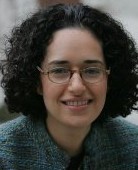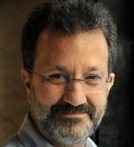
Rabbi Cohen reflects on the language of traditional kiddushin and concludes that although the transaction of kiddushin feels outdated and unequal, the language of kedushah to sanctify the ritual and infuse the marriage with holiness remains compelling. She makes an argument for making changes to the ritual but maintaining a language of kedushah.
By Rabbi Ayelet Cohen, Rabbi Marc Margolius
A Few Words on the Language of Kiddushin
Rabbi Ayelet Cohen
For most couples who are familiar with the Jewish wedding ceremony, “harei at mekudeshet li” is powerfully resonant. I have found that for many couples it is emotionally significant to say those words – it makes them “feel” married. Offering an alternate statement feels “less than.” If we truly believe that LGBTQ unions are of equal status, there is no problem using the same word for them.
Obviously, the halakhic issues are more complicated. But, if we practice a truly egalitarian Judaism, and believe that men and women are of equal halakhic status and that marriages between a man and man, woman and woman, and woman and man are of equal status, then kiddushin poses a real challenge.
Many scholars and rabbis have persuasively argued that we must abandon language of kiddushin if we are to achieve true egalitarianism in wedding ceremonies. I agree that we need to reframe the ritual. Two equal people cannot acquire one another. A partnership ritual, such as that suggested by Rachel Adler, seems much more appropriate for an egalitarian couple of any sex in this age. Yet the formula of “harei at” continues to feel like the “real thing.” I believe that the emotional resonance of these words is significant. So much of the significance of weddings lies in symbolism and emotion. This is why we craft elaborate public rituals rather than perfunctory business transactions.
Whereas the transaction of kiddushin feels outdated and inherently unequal, the idea of using language of kedushah to sanctify the ritual and infuse the marriage with holiness is compelling. Combining the partnership ritual that Rachel Adler describes in her brit ahuvim, placing the rings in a pouch and raising them, with the traditional formula of “harei at/harei ata”, achieves an egalitarian ritual with deeply resonant language. Some couples, like Tamara Cohen and Gwynn Kessler, have suggested coining a new phrase: hitkadshut, to retain the language of holiness while maintaining a greater agency:
“I sanctify myself to you,” rather than “you are sanctified to me.” Many couples, less versed in the intricacies of rabbinic language but intent on having a “real Jewish wedding” prefer the traditional formula, and I encourage them to use it.
Materials for Ceremony
Sheva Brachot — Seven Blessings
Rabbi Ayelet Cohen and Rabbi Marc Margolius
בָּרוּךְ אַתָּה ה׳ אֱלֹהֵינוּ מֶלֶךְ הָעוֹלָם בּוֹרֵא פְּרִי הַגֶּפֶן
בָּרוּךְ אַתָּה ה׳ אֱלֹהֵינוּ מֶלֶךְ הָעוֹלָם שֶׁהַכֹּל בָּרָא לִכְבוֹדוֹ
בָּרוּךְ אַתָּה ה׳ אֱלֹהֵינוּ מֶלֶךְ הָעוֹלָם יוֹצֵר הָאָדָם
בָּרוּךְ אַתָּה ה׳ אֱלֹהֵינוּ מֶלֶךְ הָעוֹלָם אֲשֶׁר יָצַר אֶת הָאָדָם בְּצַלְמוֹ
בְּצֶלֶם דְּמוּת תַּבְנִיתוֹ וְהִתְקִין מִמֶּנּוּ בִּנְיָן עַדֵי עַד.
שׂוֹשׂ תָּשִׂישׂ וְתָגֵל צִיּוֹן, עֲקִירַת שִׂנְאַת חִינָּם מִתּוֹכָהּ בְּשִׂמְחָה
בָּרוּךְ אַתָּה ה׳ מְשַׂמֵּחַ צִיּוֹן בְּאַהֲבַת שָׁלוֹם
אַתָּה ה׳ מְשַׂמֵּחַ רֵעִים הָאֲהוּבִים
כַּלָּה וְכַלָּה/ חָתָן וְחָתָן / חָתָן וְכַלָּה
בָּרוּךְ אַתָּה ה׳ יוֹצֵר האָדָם
שַׂמֵּחַ תְּשַׂמַּח רֵעִים הָאֲהוּבִים כְּשַׂמְחֵךָ יְצִרֵךָ בְּגָן עֶדֶן מִקֶדֶם.
בָּרוּךְ כַּלָּה וְכַלָּה /חָתָן וְחָתָן/ חָתָן וְכַלָּה
בָּרוּךְ אַתָּה אֱלֹהֵינוּ מֶלֶךְ הָעוֹלָם אֲשֶׁר בָּרָא שָׂשׂוֹן וְשִׂמְחָה, רֵעִים אֲהוּבִים
אֱלֹקֵינוּ מְהֵרָה ה׳ גִּילָה רִנָּה, דִּיצָה וְחֶדְוָה, אָהֲבָה וְאַחֲוָה, וְשָׁלוֹם וְרֵעוּת / כַּלָּה וְכַלָּה
יִשְׁמַע בְּעָרֵי יְהוּדָה וּבְחוּצוֹת יְרוּשָׁלַיִם, קוֹל שָׂשׂוֹן, וְקוֹל שִׂמְחָה
קוֹל חָתָן וְקוֹל כַּלָּה/קוֹל כַּלָּה וְקוֹל כַּלָּה/קוֹל חָתָן וְקוֹל חָתָן
קוֹל מִצְהֲלוֹת אֲהוּבִים מְחֻפָּתַם, וַאֲהוּבוֹת מִמִּשְׁתֶּה נְגִינָתָן
בָּרוּךְ אַתָּה ה׳ מְשַׂמֵּחַ הָאֲהוּבִים
כַּלָּה עִם הַכַּלָּה/ חָתָן עִם הֶחָתָן/ חָתָן עִם הַכַּלָּה
Blessed are You, God, Source of Life, everything reveals your glory.
Blessed are You, God, Source of Life, creator of humanity.
Blessed are You, God, Source of Life, who creates the fruit of the vine.
Blessed are you God, Source of Life, who has created the variety of humanity in the Divine image, and entrusted us with the responsibility of building the future. Blessed are You, God, creator of humanity.
May Zion rejoice in the uprooting of senseless hatred from its midst. Blessed are You, God, who causes Zion to rejoice through love of peace.
May these loving companions rejoice as You have caused Your creations to rejoice in Eden from the beginning. Blessed are You, God, who brings joy to loving companions.
Blessed are You, Source of Life, who creates joy and happiness, loving companions, gladness, singing, joy, and delight, love and intimacy, peace and friendship. May we soon hear throughout Jerusalem voices of joy and happiness, sounds of gaiety and love in all its variety, the jubilant voices of lovers from within their chambers, the sounds of loving partners feasting and singing. Blessed are you, God, who rejoices with lovers.
© Ayelet Sonya Cohen and Marc J. Margolius, adapted from a blessing by Tamara Ruth Cohen, Gwynn Kessler, and Ayelet Sonya Cohen
Birkat Erusin — Betrothal Blessing
Rabbi Ayelet Cohen and Rabbi Marc Margolius
The betrothal blessing expresses the commitment to enter into this next stage of a sexually exclusive, committed partnership.
Although the standard text concerns prohibitions, this reframing of the blessing affirms the holiness and wholeness of a healthy, liberated sexuality, and sanctifies the couple’s commitment to a relationship founded upon rigorous honesty and mutual respect.
בָּרוּךְ אַתָּה ה׳ אֱלֹהֵינוּ רוּחַ (מֶלֶךְ) הָעוֹלָם בּוֹרֵא פְּרִי הַגֶּפֶן.
בָּרוּךְ אַתָּה ה׳ אֱלֹהֵינוּ רוּחַ (מֶלֶךְ) הָעוֹלָם מַתִּיר אֲסוּרִים מִפַּחַד בּוּשָׁה וּכְלִימָה
וּפוֹתֵחַ לִבֵּנוּ לִקְדֻשַּׁת הַגּוּף וְעֶדְנָתוֹ וְכַוֵּן לִבֵּנוּ לְהִתְאָּרֵס בְּצֶדֶק וּבַמִּשְׁפָּט וּבַחֶסֶד וּבָרַחֲמִים
בָּרוּךְ אַתָּה ה׳ מְקַדֵּשׁ יִשְׂרָאֵל עַל יְדֵי אָהֲבָה בְּכָבוֹד וּבֶאֱמֶת
Blessed are You our God, Source of Life, who creates the fruit of the vine.
Blessed are You, our God, Source of Life, who frees us from fear and shame and opens us to the holiness of our bodies and their pleasures. You guide us to entwine our hearts in righteousness, justice, loving kindness and compassion. Blessed are You, who sanctifies Israel through love that is honorable and true.
© Ayelet Sonya Cohen and Marc J. Margolius, adapted from a blessing by Tamara Ruth Cohen, Gwynn Kessler, and Ayelet Sonya Cohen
 Rabbi Ayelet S. Cohen served for ten years at New York City’s Congregation Beit Simchat Torah, the world’s largest LGBT synagogue serving people of all sexual orientations and gender identities. Passionately committed to progressive and feminist Judaism, she is an activist and an advocate for full inclusion and celebration of LGBT Jews in the Jewish world and for LBGT civil rights. A scholar, teacher, translator, and writer, Rabbi Cohen is an editor of Siddur B’chol Levavcha, a prayerbook featuring queer and feminist liturgy. Her articles and essays on Jewish and LGBT issues appear in numerous books and periodicals. She lectures and facilitates workshops on Jewish, feminist, and LGBT issues. She is a member of the Rabbinical Assembly and the New York Board of Rabbis, and serves on the board of Rabbis for Human Rights—North America.
Rabbi Ayelet S. Cohen served for ten years at New York City’s Congregation Beit Simchat Torah, the world’s largest LGBT synagogue serving people of all sexual orientations and gender identities. Passionately committed to progressive and feminist Judaism, she is an activist and an advocate for full inclusion and celebration of LGBT Jews in the Jewish world and for LBGT civil rights. A scholar, teacher, translator, and writer, Rabbi Cohen is an editor of Siddur B’chol Levavcha, a prayerbook featuring queer and feminist liturgy. Her articles and essays on Jewish and LGBT issues appear in numerous books and periodicals. She lectures and facilitates workshops on Jewish, feminist, and LGBT issues. She is a member of the Rabbinical Assembly and the New York Board of Rabbis, and serves on the board of Rabbis for Human Rights—North America.
 Rabbi Marc J. Margolius is the spiritual leader of West End Synagogue, a Reconstructionist congregation in Manhattan. He also currently directs alumni programs for the Institute for Jewish Spirituality, a center for the cultivation of Jewish contemplative practices among rabbis, cantors, educators and lay leaders. Rabbi Margolius previously conceived and directed for five years the Legacy Heritage Innovation Project, an initiative supporting systemic educational transformation in congregations across North America, Europe and Israel, and served as Director of Jewish Life and Identity for the Jewish Community Centers of Philadelphia.
Rabbi Marc J. Margolius is the spiritual leader of West End Synagogue, a Reconstructionist congregation in Manhattan. He also currently directs alumni programs for the Institute for Jewish Spirituality, a center for the cultivation of Jewish contemplative practices among rabbis, cantors, educators and lay leaders. Rabbi Margolius previously conceived and directed for five years the Legacy Heritage Innovation Project, an initiative supporting systemic educational transformation in congregations across North America, Europe and Israel, and served as Director of Jewish Life and Identity for the Jewish Community Centers of Philadelphia.
We encourage you to download this resource and share it with others as long as you credit the authors and Keshet.